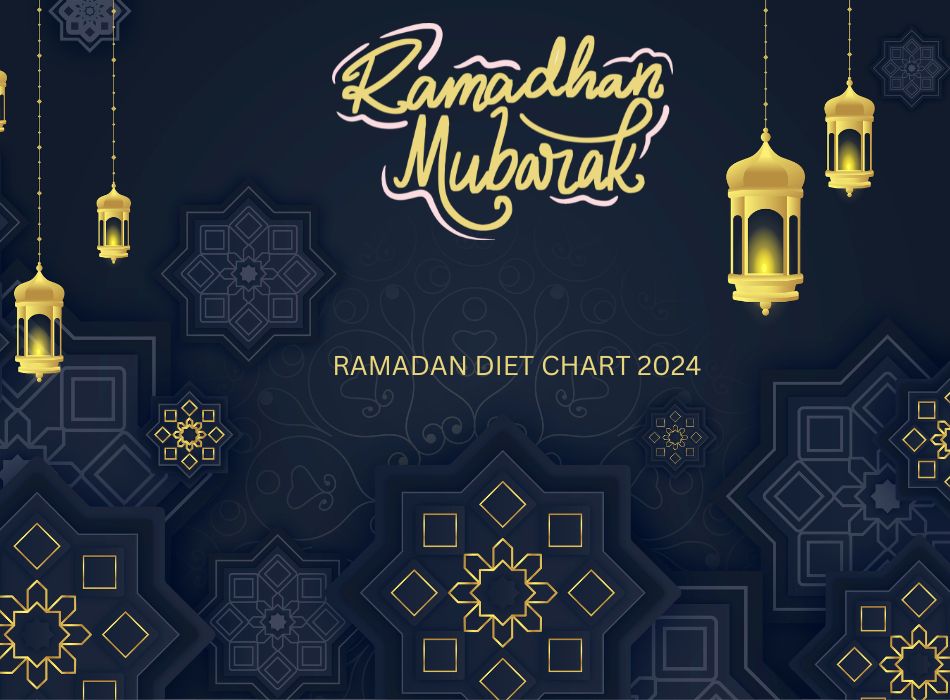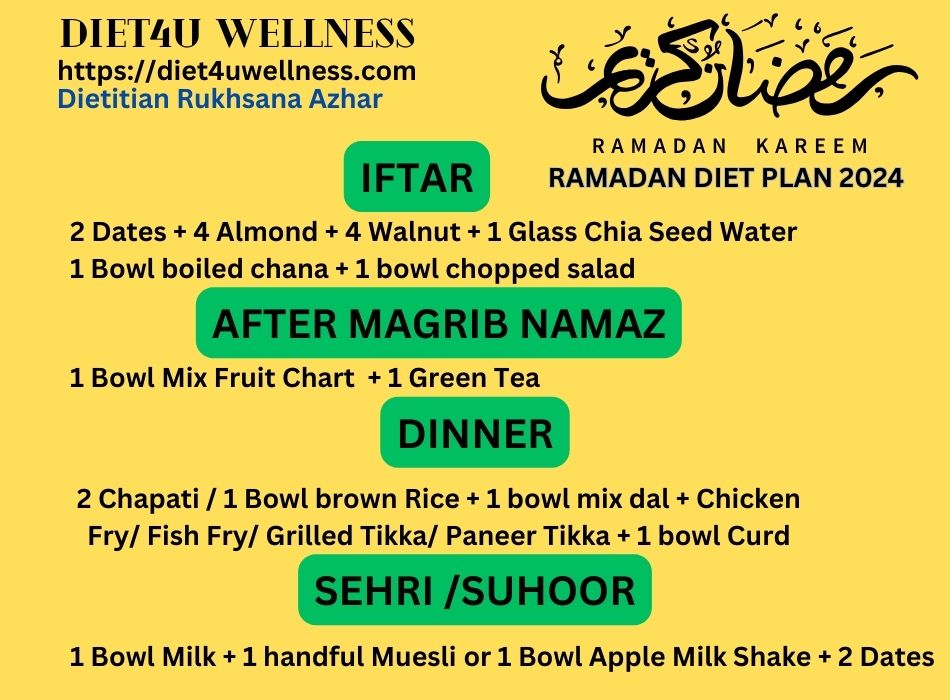
Elevate Your Fasting Experience: Your Personalized Ramadan Diet Chart 2024
Ramadan is the ninth month of the Islamic lunar calendar, during which Muslims worldwide fast from dawn until sunset. This fasting, known as Ramadan, is one of the Five Pillars of Islam and serves as a time for self-discipline, reflection, and spiritual growth.
Ramadan is not just a month of fasting; it’s a time for spiritual reflection, self-discipline, and communal solidarity. As Muslims around the world prepare to observe this sacred month, it’s essential to maintain a balanced diet to ensure health and vitality throughout Ramadan. In this guide, we’ll explore the Ramadan diet plan for weight loss and chart 2024, providing practical tips and insights to help you make the most of this spiritual journey while nourishing your body.
Aim for a balanced diet during Ramadan, incorporating a variety of foods from all food groups to ensure you’re getting essential nutrients. Include whole grains, lean proteins, healthy fats, fruits, and vegetables in your meals to promote overall health and well-being.
Optimize Your Nutrition: The Definitive Ramadan Diet Chart 2024
• Start with 2 dates & a glass of water.
• After full day fasting go light on system.
• After date & water, take a small bowl of fruit & nuts.
• Take proper food, take dal / palm size protein + rice/ roti + seasonal vegetable / sautéed vegetable.
• After 1 hour, take chaach or curd
• Give gap of 2hours between meals.
• After namaz at Sehri take milk & vermicelli / oat meal / milk with muesli (fruits & nuts added), avoid salt in morning to avoid thirst during day.
• Include all seasonal fruits & veggies for complete nutrition
• Avoid deep fried & complete non veg diet because it gives craving for water during roza.
• Include 20 gm of fibre during eating window. Don’t take less or excessive to avoid constipation or dehydration.
Best Ramadan Diet chart 2024 prepared by dietitian Rukhsana Azhar

Importance of Dates in Ramadan Diet Chart 2024
Dates are packed with essential nutrients, making them an ideal food to break the fast. They are rich in carbohydrates, fiber, vitamins, and minerals, providing an instant energy boost after a day of fasting.
In Islamic tradition, dates hold spiritual significance. It is believed that the Prophet Muhammad broke his fast with dates and water, emphasizing their importance in Ramadan.
FASTING: Is it safe and good for you?
From water fasting to intermittent fasting, and calorie restriction, there are many different types of fasting that fit nearly every lifestyle. Coupled with a nutritious diet and healthy lifestyle, incorporating fasting into your routine could benefit your health. It offers a wide array of potential health benefits like weight loss, improved blood sugar control, heart health, brain function, prevention of neurodegenerative disorders, cancers, and decreased inflammation.
1. Blood sugar control by reducing insulin resistance
Intermittent fasting and alternate day fasting helps decrease blood sugar levels and reduce insulin resistance. Decreasing insulin resistance increases your body’s sensitivity to insulin, allowing it to transport glucose from your bloodstream to your cells more efficiently.
2. Better health by fighting inflammation
Fasting decreases several markers of inflammation and may help in treating inflammatory conditions such as multiple sclerosis and reducing certain risk factors for heart disease, cancer, and rheumatoid arthritis.
3. Enhancing heart health
Fasting has helped lower risk of coronary heart disease and help lower blood pressure, triglycerides, cholesterol levels and LDL (bad) cholesterol.
4. Boosting brain function, preventing neurodegenerative disorders
Fasting improves brain function, increases nerve cell synthesis to help enhance cognitive function, and protects against neurodegenerative conditions, such as Alzheimer’s disease and Parkinson’s.
5. Aids weight loss by limiting calorie intake and boosting metabolism
Short-term fasting boosts metabolism by increasing levels of the neurotransmitter norepinephrine, which enhances weight loss. It also leads to greater reductions in body fat and belly fat compared to continuous calorie restriction.
6. Increased growth hormone secretion
Fasting increases levels of human growth hormone (HGH), an important protein hormone that plays a role in growth, metabolism, weight loss, and muscle strength.
7. Impacting longevity
Fasting may delay aging and increase longevity, but human research is still in process.
8. Aid in cancer prevention, increase in effectiveness of chemotherapy
Research shows fasting could block tumor development and increase the effectiveness of chemotherapy.
Safety and side effects:
Despite the long list of possible health benefits of fasting, it may not be right for everyone. For example, if you have diabetes, fasting can lead to spikes and crashes in your blood sugar levels, which could be dangerous.
Fasting without medical supervision is not recommended for older adults, adolescents, or underweight people. It is best to talk to a doctor first if you have any underlying health conditions or are planning to fast for more than 24 hours.
If you decide to try fasting, be sure to stay well-hydrated and fill your diet with nutrient-dense foods during your eating periods to maximize the potential health benefits.
If fasting for longer periods, minimize intense physical activity and get plenty of rest.

Hello My Name is Dt. Ruksana Azhar and I am a certified dietician and providing online & offline services for Weight Management, PCOS/PCOD Management, Diabetes Management , etc. I have 12+ years of experience in the Apollo Hospital Delhi , Max Super Specialty Hospital Delhi, Lilavati Hospital Mumbai and VLCC healthcare Mumbai. I loves to write healthcare and lifestyle related blog. My favorite part of being a doctor is the opportunity to directly improve the health and wellbeing of my patients and to develop professional and personal relationships with them.



